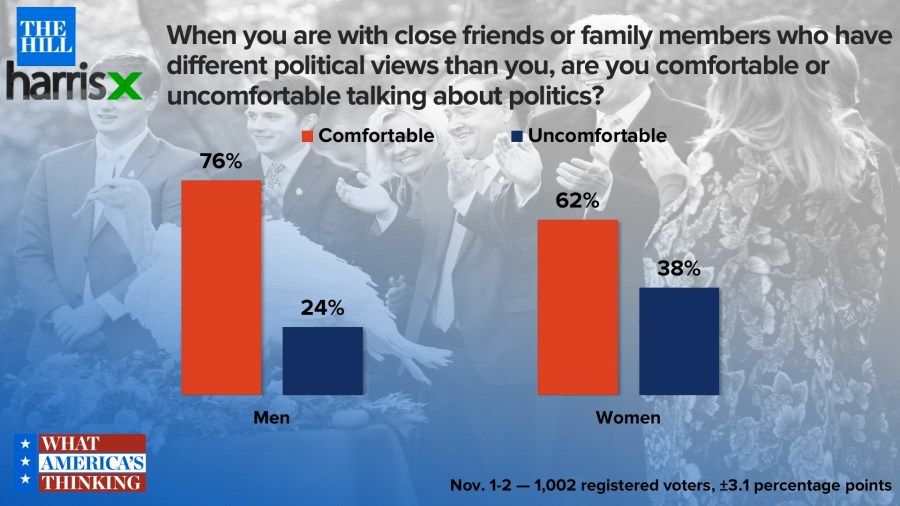A new Hill-HarrisX poll shows a sizable gender gap between men and women when it comes to discussing politics, even though a majority of both genders say they feel comfortable broaching the subject.
Sixty-nine percent of voters said they feel comfortable talking about politics with friends and family who have different political views, compared to 31 percent who said didn’t feel comfortable addressing the issue, according to the survey released on Wednesday.
 But men are 14 percentage points more likely to say they feel comfortable talking about politics. A full 76 percent of men said in the poll they are comfortable with discussing political issues, compared to 62 percent of women.
But men are 14 percentage points more likely to say they feel comfortable talking about politics. A full 76 percent of men said in the poll they are comfortable with discussing political issues, compared to 62 percent of women.
There was a similar disparity between urban and suburban voters: 76 percent of urban voters said they felt comfortable talking about politics, while 65 percent of suburban voters said the same.
Voters across party lines largely felt comfortable addressing the issue, though this sentiment was slightly stronger among Republican respondents.
Seventy percent of GOP voters said they were comfortable talking about politics with friends and family. Similarly, 69 percent of Democratic voters and 66 percent of independent voters also feel comfortable about the topic.
The survey comes as lawmakers take their leave for their one-week Thanksgiving recess.
Upon their return, House Democrats are poised to begin the third phase of their impeachment inquiry.
The two-month-long probe took another turn Tuesday as the House Judiciary Committee scheduled its first hearing in the investigation into President Trump’s dealings with Ukraine. Democratic lawmakers are currently investigating whether Trump used his office to pressure Ukraine to launch investigations into his political rivals.
Judiciary Committee Chairman Jerrold Nadler (D-N.Y.) announced Tuesday that the panel will hear from legal scholars on Dec. 4 as Democrats weigh whether whether to move forward on articles of impeachment.
The Hill-HarrisX surveyed 1,002 registered voters from Nov.1-Nov.2. It has a margin of error of plus or minus 3.1 percentage points.
—Tess Bonn
hilltv copyright
